July 10, 2025 – Asia Tour Lecture (2) Ho Chi Minh, Vietnam
Hello. Today marks the second stop of the Asia tour lectures, with Venerable Pomnyun Sunim’s Dharma Q&A being held in Ho Chi Minh, Vietnam’s largest city.
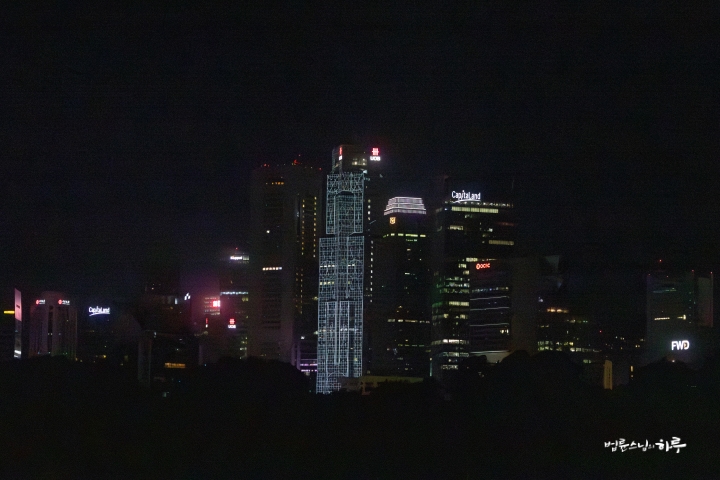
After completing morning practice and meditation, Sunim headed to Singapore Changi International Airport at 4:30 AM.
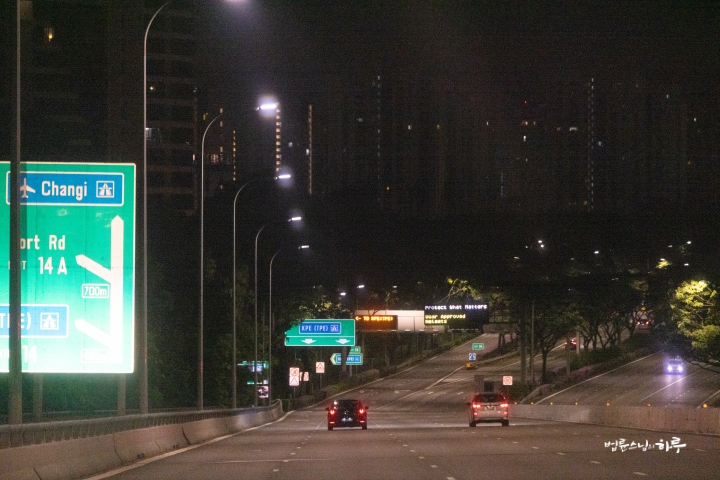
After completing departure procedures, Sunim took photos and exchanged farewell greetings with Singapore Jungto Society members who had come to see him off at the airport.
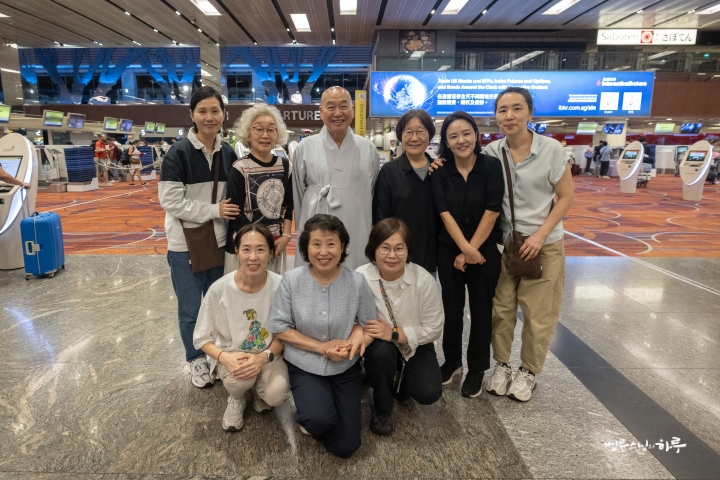
After waiting at the boarding gate, Sunim boarded the plane at 7 AM and departed Singapore for Ho Chi Minh, Vietnam.


While crossing the sky, brilliant sunlight spread across the clouds outside the window.

After a two-hour flight, the plane landed at Ho Chi Minh airport at 8 AM local time. The immigration process took two hours due to long queues. According to a local resident, the Vietnamese government had significantly reduced the number of civil servants, resulting in a shortage of airport staff.

Sunim finally exited the airport after 10 AM. Vietnam Jungto Society members warmly welcomed him.
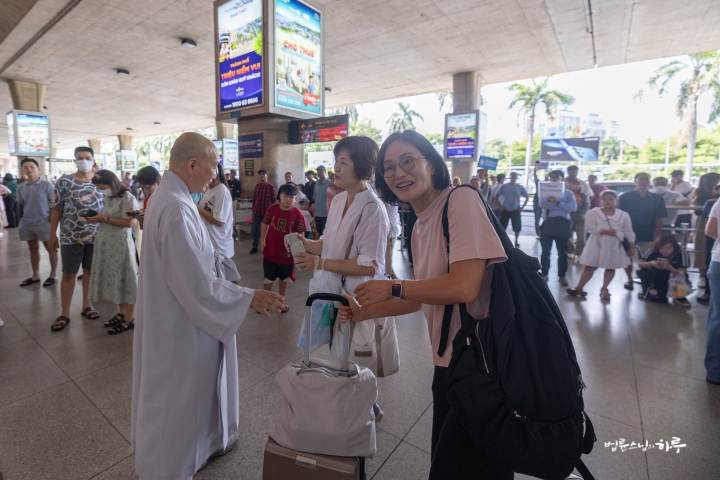
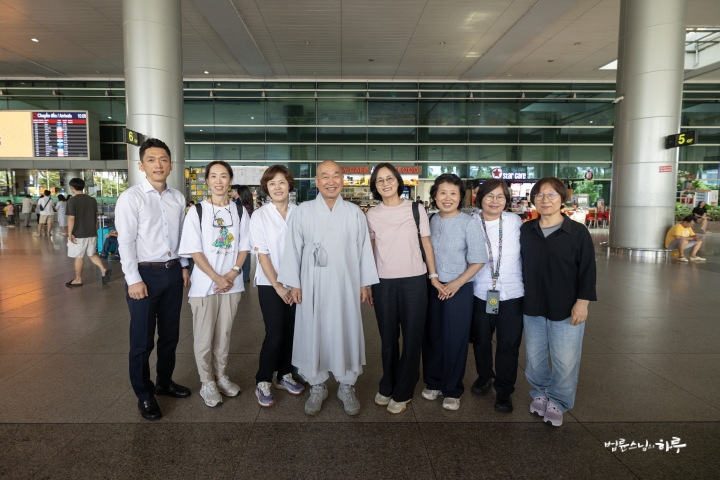
“Welcome to Vietnam!”
After exchanging greetings and taking photos, Sunim immediately headed to the accommodation. On the way, the dedicated volunteers who had prepared the lecture wanted to treat Sunim to lunch, so they headed to a restaurant near the accommodation.
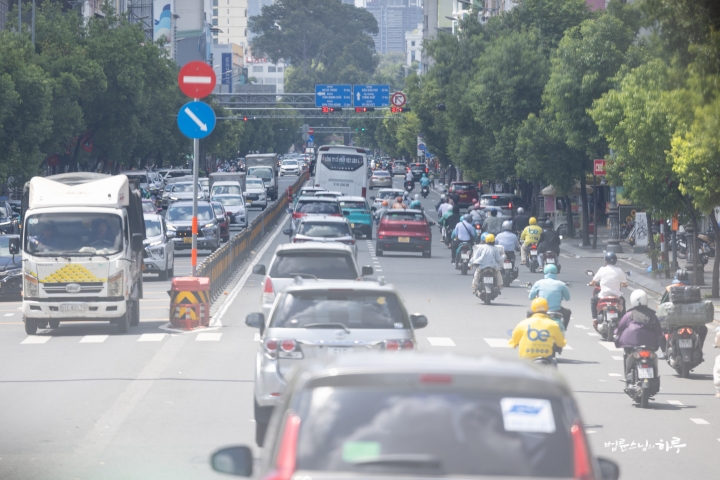
At the restaurant, they had rice noodles while conversing. The attendees were team leaders responsible for various aspects of tonight’s lecture, including external guidance, internal guidance, stage management, and booth operations. They had spent the entire month of June putting up posters, hanging banners, and preparing the lecture with dedication.
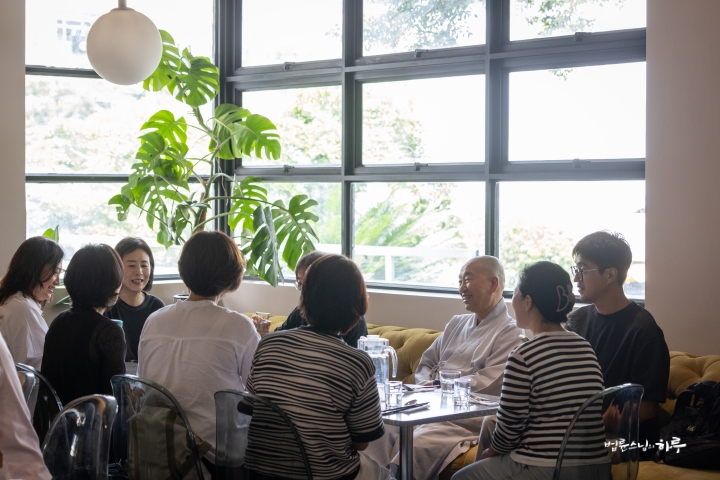
After encouraging the volunteers for their hard work, Sunim moved to the accommodation. Lee Hye-jin, a Vietnam Jungto Society member, had prepared her home as accommodation.
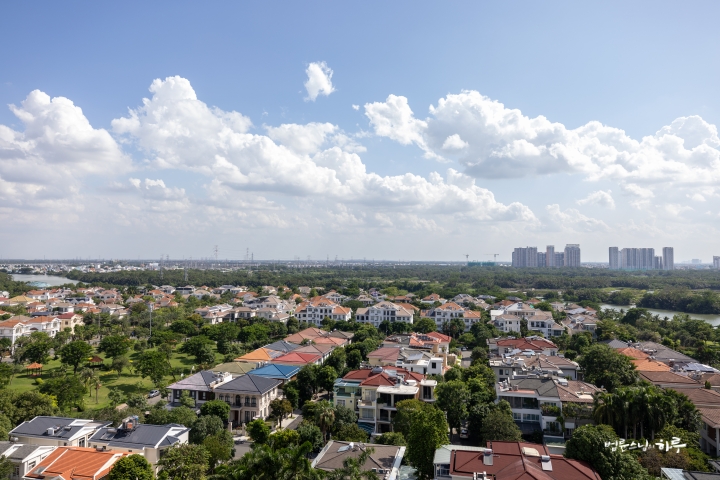

The daytime temperature rose to 34 degrees Celsius, making it extremely hot and humid. In the afternoon, Sunim avoided the heat by staying at the accommodation, communicating with Korea and handling work matters before taking a rest. After having dinner at the accommodation, he headed to the lecture venue at 6:30 PM.
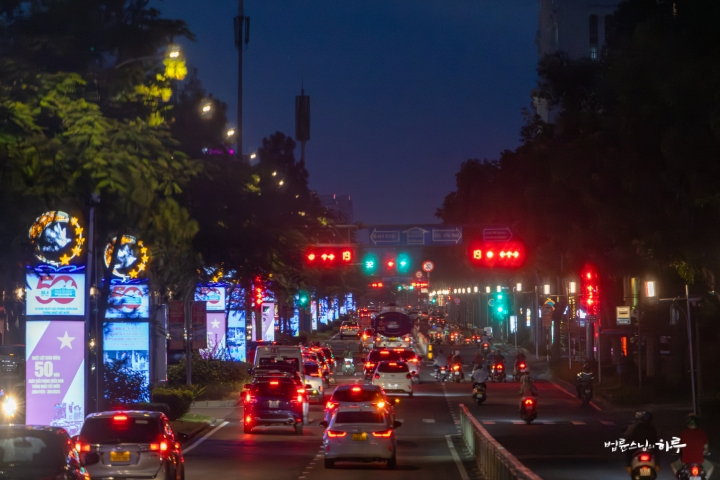
Today’s lecture was held at the MERPERLE CRYSTAL PALACE Hotel located in Phu My Hung New Town, Ho Chi Minh City, Vietnam.
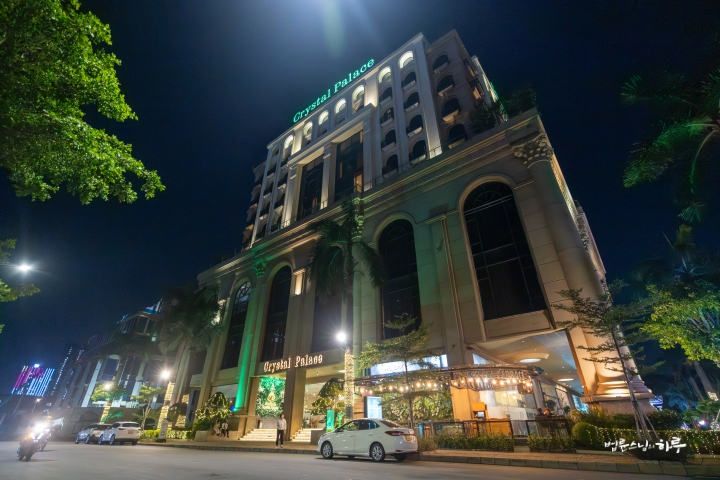
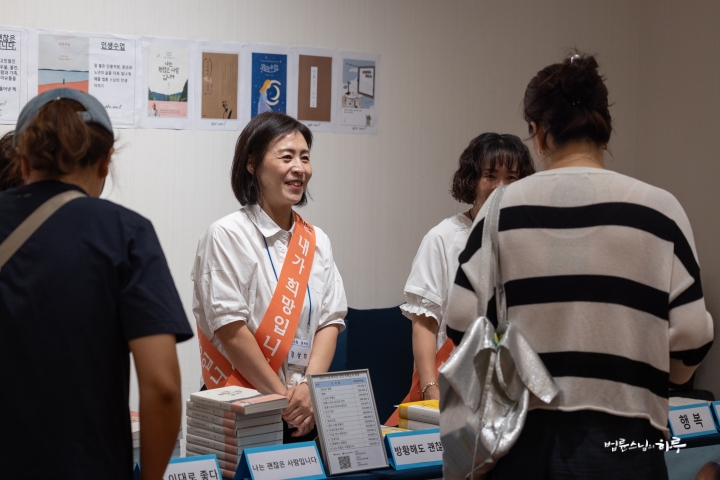
Volunteers were warmly welcoming lecture attendees everywhere. When Sunim arrived, a local Vietnamese person who had received great help from Sunim’s dharma talks presented him with a lotus bouquet.
“Thank you, Sunim.”
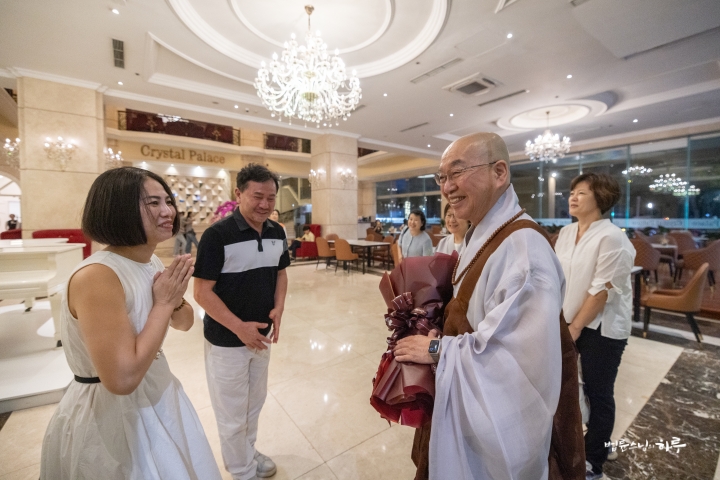
After exchanging greetings, Sunim entered the lecture hall. About 150 expatriates were seated in the venue. When Sunim appeared, they gave him a big round of applause.
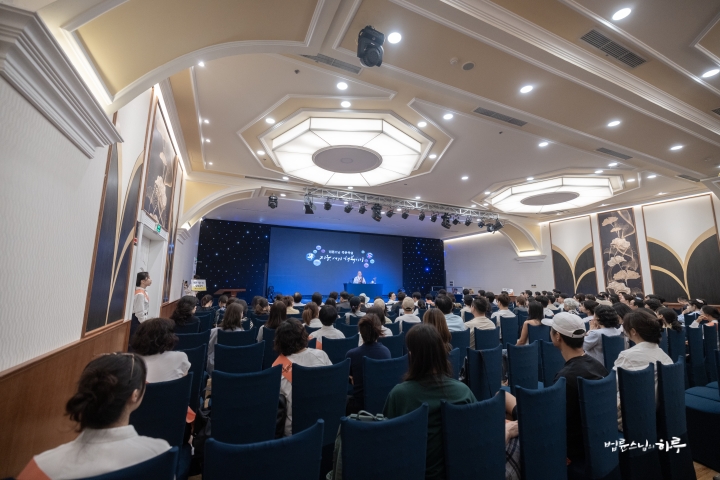
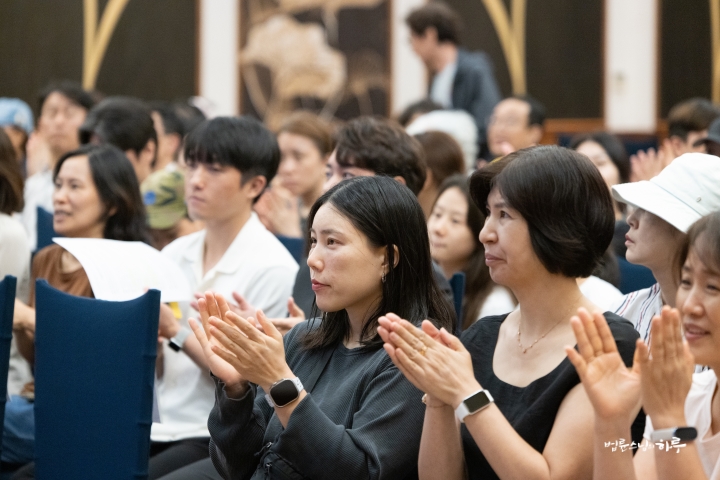
After watching a video together about JTS completing construction of a school for 4,000 students in the Syria earthquake-affected area last year, Sunim took the stage. Enthusiastic applause and cheers came from the audience. Sunim smiled and gave his opening remarks.
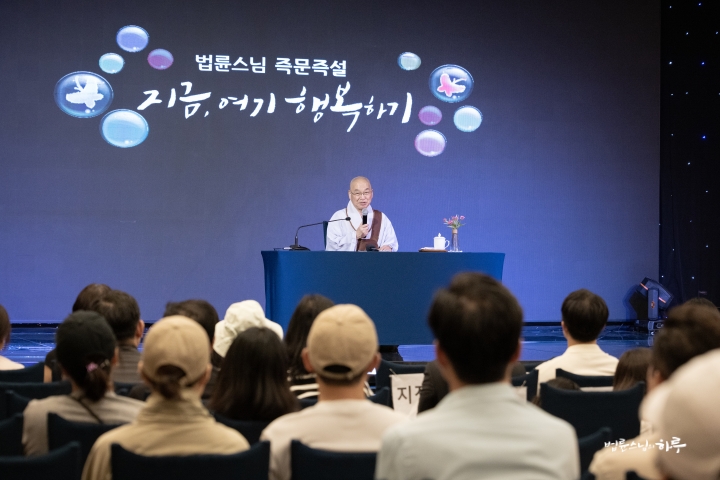
“The video you just watched shows the recovery efforts in the Turkey-Syria earthquake disaster area from two years ago. This region is Syrian territory near the Turkish border, which at the time was controlled by rebels due to the Syrian civil war. It was where democratic rebels were active, who had been conducting democratization movements and resisting after being bombed by the Assad regime. Shortly after Jungto Society completed the school construction, the democratic rebels overthrew the Assad government and took control of the Syrian government. So now, the people who worked on the reconstruction project back then ended up becoming representatives. of the Syrian government.
Civilian Efforts Opening Diplomatic Doors: JTS’s Syria Reconstruction
Syria had been devastated after experiencing civil war for about 12 years, and the situation became even more difficult when earthquakes occurred on top of that. However, a new government has now been established, and reconstruction work continues. While we don’t know how long the recovery will take, I believe Syria will recover just as it took us decades to rise from the ruins of the Korean War.
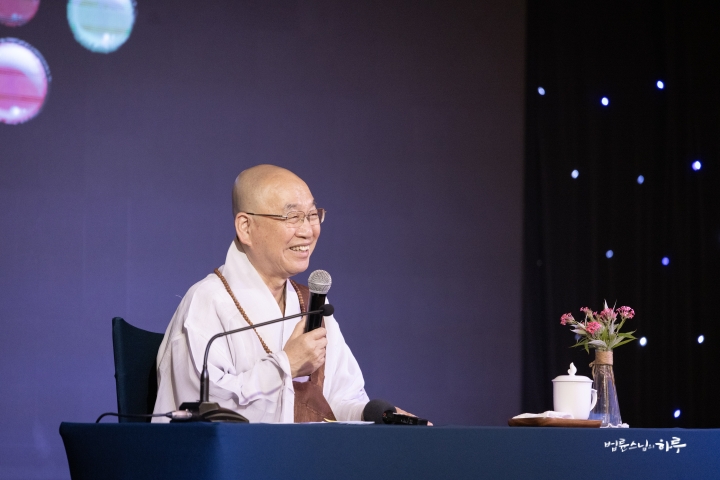
I believe JTS’s activities have been of small help in this process. Syria was the only UN member state that had not established diplomatic relations with Korea, but this year we established diplomatic ties with Syria. During the diplomatic negotiations, the Syrian Foreign Minister mentioned that ‘we received a lot of help from Korean citizens when we were in difficulty,’ referring to the school built by JTS. This shows how civilian organization activities can sometimes greatly benefit national interests, as we learned through this activity.”
Following this, those who registered to ask questions at the entrance raised their hands and engaged in dialogue with Sunim. During the two hours, 11 people asked Sunim questions. One of them asked for Sunim’s advice on how to protect himself when his girlfriend constantly complains when she’s having a hard time and gets extremely angry if he doesn’t empathize with her.
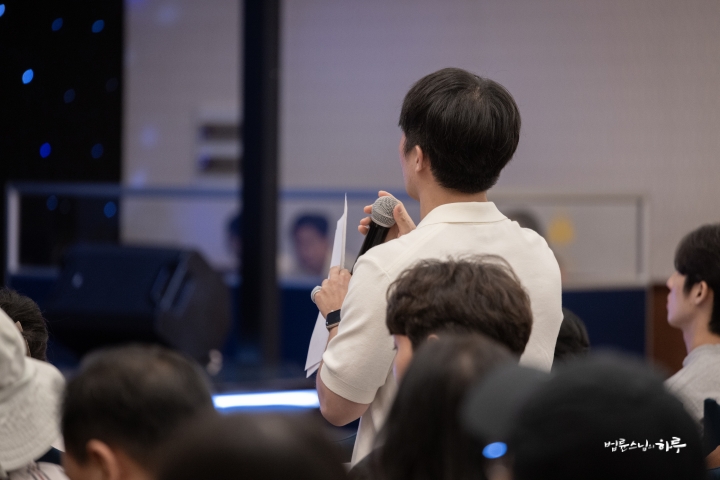
My Girlfriend’s Negative Emotions Are Too Hard to Handle
“What is a friend? Isn’t a friend someone you can talk to when you’re having difficulties? Beyond girlfriend or boyfriend, isn’t that what a friend is? I think if you’re friends, you should be able to say ‘I see. That must have been hard’ no matter what they talk about. Of course, being friends doesn’t mean you can only say ‘You did well.’ If a friend has done something wrong, you should sometimes be able to speak frankly. That’s how friendships can last long.
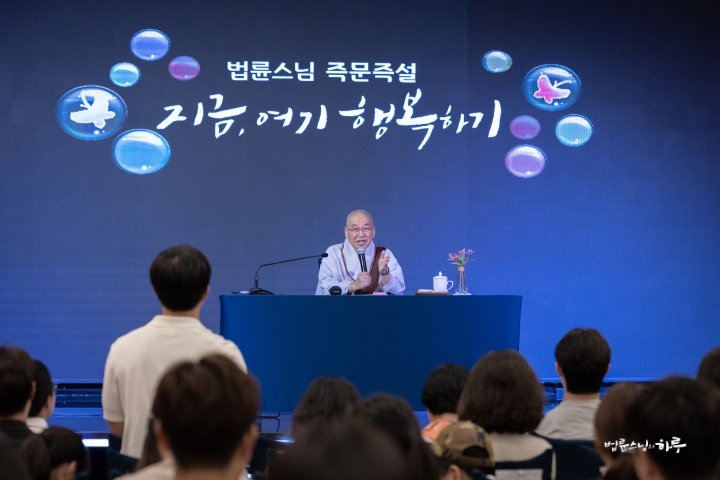
However, when someone says they’re struggling and you respond with ‘It would be better to think about it this way rather than that way,’ the listener might feel hurt or become defensive. The same applies even when Sunim says it. However, people tend to be less defensive with Sunim. The reason is that there’s no personal stake between them. But among family members, lovers, or friends, they’re not really asking for solutions. They just want to vent and have the other person sympathize with them. In relationships with family, friends, and relatives, sympathizing with such emotions doesn’t cause major problems.
Of course, you shouldn’t condone drug use or assaulting others. I’m not saying you should agree with statements like ‘That person deserved to be hit.’ This is why Buddhism has traditionally taught five precepts that people should not violate: harming others, causing damage to others, tormenting others, deceiving others, and causing trouble while intoxicated with drugs or alcohol. In such cases, it’s necessary to help them realize that these actions will ultimately bring harm to themselves.
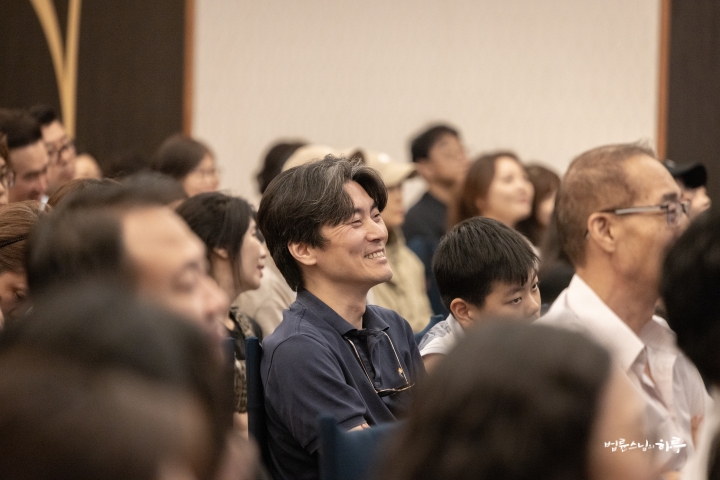
In other situations, whether with romantic partners, friends, or family members, it’s generally better to empathize and offer comfort by saying something like, “I understand, you must have been going through a lot.” This is because when people ask Sunim questions, they’re looking for solutions, but when they talk to friends, they don’t necessarily want solutions. If you offer solutions, they might react negatively, thinking, “Yeah, you think you’re so smart!” What they need is emotional comfort, like when a child seeks affection from their parents. In such cases, it’s best to offer empathetic words and gently pat them on the back. Saying things like “You shouldn’t have done that” doesn’t help at all. You won’t get criticized if you don’t try to teach them something. Why do people get angry? It’s because they think, “Do you think I don’t know that already?”
On the other hand, these experiences can be valuable for understanding the other person better. After dating for several years and going through various experiences, if you notice that even as friends, they resort to verbal abuse when things don’t go their way, you can predict that married life might be quite turbulent. This helps you realize that while dating might be fine, marriage could be challenging. Isn’t it better to know this? If you got married without knowing this, wouldn’t married life be difficult? If you divorced after having children, the situation would become much more complicated. So these experiences aren’t always bad.
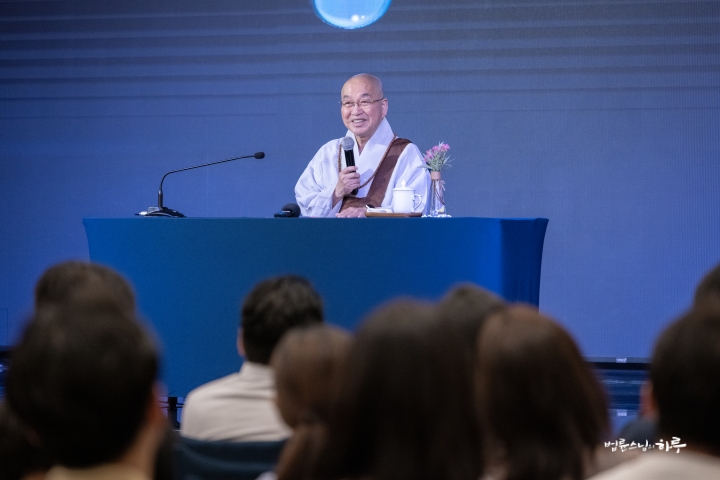
The same applies to married couples. If you want to continue living together, you shouldn’t try to win arguments with words. Verbal abuse or physical violence always stems from trying to win with words. When people can’t win with words, they try to win with force. If possible, just agree with them. Some people ask, ‘How can I agree when they’re saying something wrong?’ But at times like these, you shouldn’t worry about what’s ‘right’ or ‘wrong.’ If you want to debate such things, tell them to ‘Ask Sunim!’ You can debate with me a little. I’m old, I’m a monk, I have no vested interests with you, and I won’t be upset if you don’t agree with me. (Laughter)
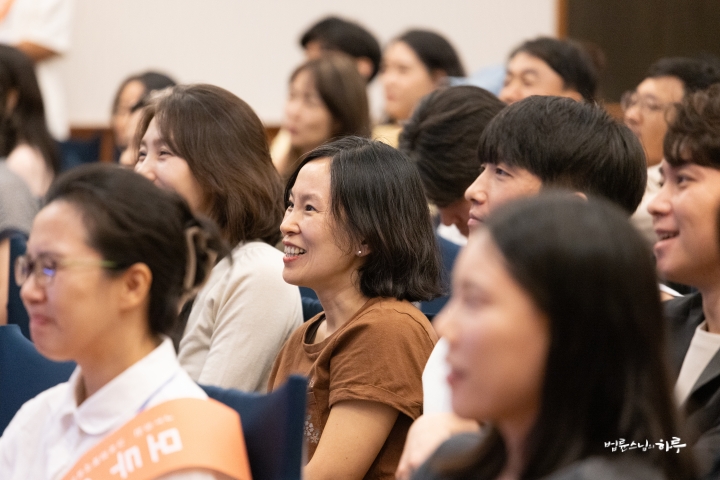
Yesterday, someone asked, ‘I get so angry. What should I do?’ I asked, ‘Should I be honest with you? Should I comfort you?’ They said, ‘Something in between would be good.’ So I spoke honestly to them, saying things like, ‘Oh my, yes, you’re so great.’ (Laughter)
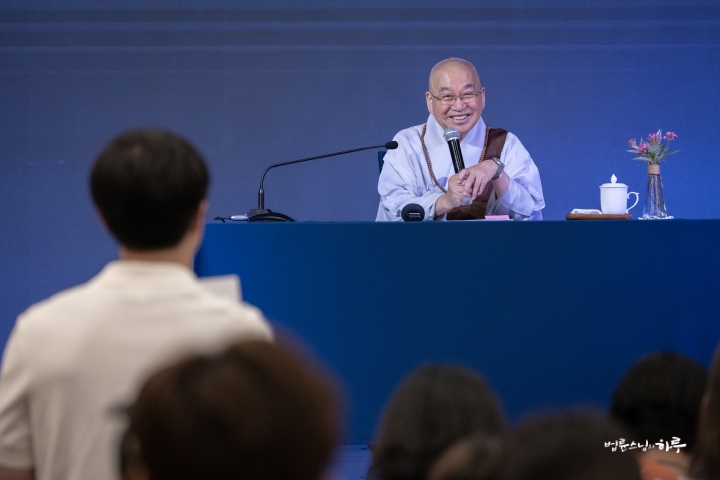
Ultimately, it comes from a sense of self-importance. Getting angry easily stems from thinking too highly of oneself. When you feel hatred or anger toward someone, I told him to say to himself, ‘Oh my, aren’t you special.’ He quickly understood what I meant. When I asked if he needed further explanation, he said no. Between friends, the best approach is to empathize as much as possible.”
“I understand clearly.”
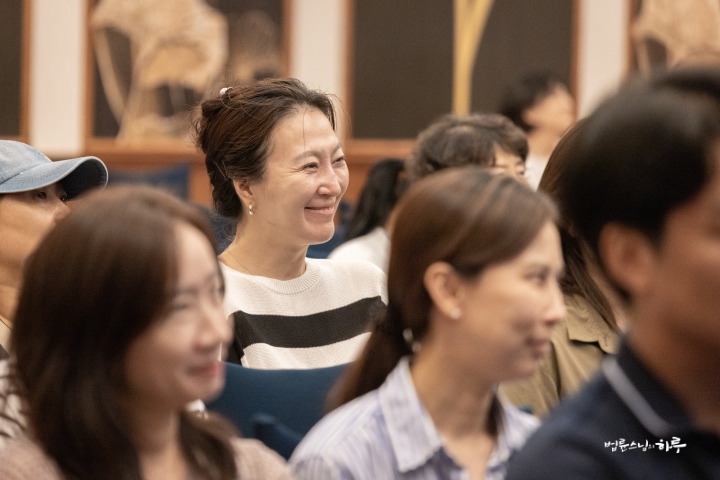
Questions continued one after another.
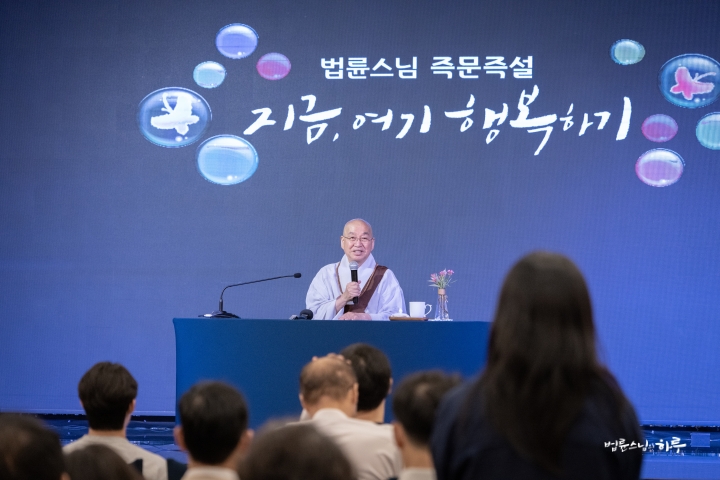
The AI era has arrived, and AI seems to deny religion. I’m curious whether religion can survive in this situation.
I was living without thinking about marriage or having children, but suddenly I became anxious when I started comparing myself to others. What mindset should I have going forward?
During vacation, being with my children 24 hours a day, we have severe conflicts over studying. How can I get my bright and cheerful children to study voluntarily?
I try to raise my son and daughter without discrimination, but should there be a hierarchy based on age? While there’s no discrimination between genders, what about age?
What does Sunim mean when you say “let go of yourself” in your book?
Sunim must also experience stress. How do you relieve stress?
I’ve been living as an expat for about a year, but my network and friendships in Ho Chi Minh City aren’t as good as in Korea. How can I overcome this?
Historically, during the Japanese invasion, Master Samyeong killed people, and I feel uncomfortable after killing countless cockroaches. How should I think about this?
I came here for language study in my 20s at my parents’ suggestion, and it’s been a week. Sometimes I have gloomy thoughts. What mindset should I have to live diligently going forward?
After having sufficient dialogue with the questioners, Sunim concluded the lecture by discussing what perspective we should have in living our lives in these times of great change.
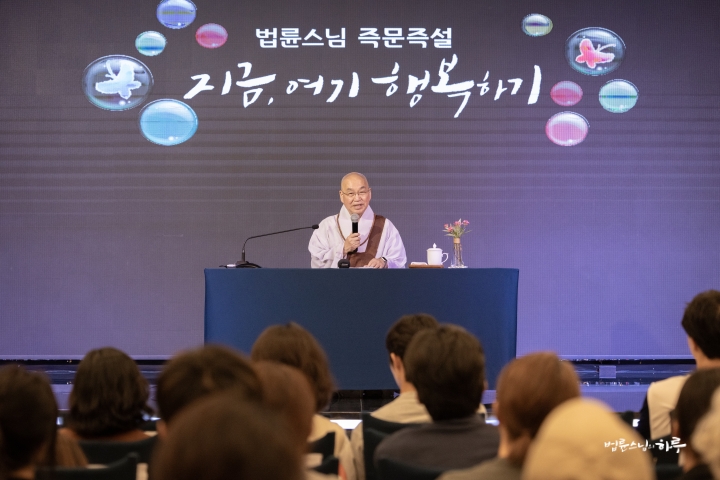
“Since the Trump administration came to power, the United States has judged that the world order they led after World War II is disadvantageous to them. So the Trump administration is trying to dismantle this and establish a new order. In this process, the entire world is in a somewhat chaotic state. However, we cannot simply judge these changes as ‘good’ or ‘bad.’ Some people may feel that today is worse compared to yesterday, while others may feel that today is better than yesterday. This is the nature of change.
For example, when a couple who liked each other breaks up, from the man’s perspective, it might be a bad change since he separated from the woman he liked. But if there’s another man who likes that woman, from his perspective, it would be a good change. This is how the world works. Change is just change; there is no inherent good or bad. Good and bad are merely relative judgments that depend on which perspective you take and what you compare it to.
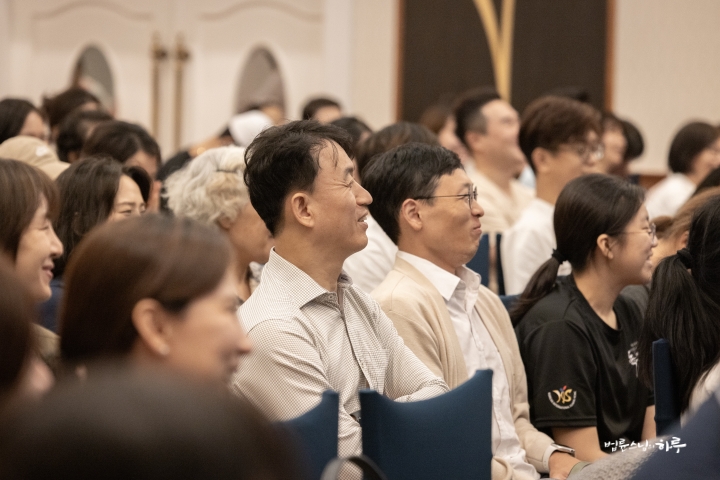
How to Respond Wisely to Change
While we cannot predict change precisely, we must consider how to respond to it by inferring the general direction it might take. When someone says, “Let’s break up,” that represents a change in the relationship. A new encounter is also a change in relationship. Rather than judging these changes as “good” or “bad,” we should face the reality of the relationship change, infer what changes might occur in the future, and study ways to respond to those changes.
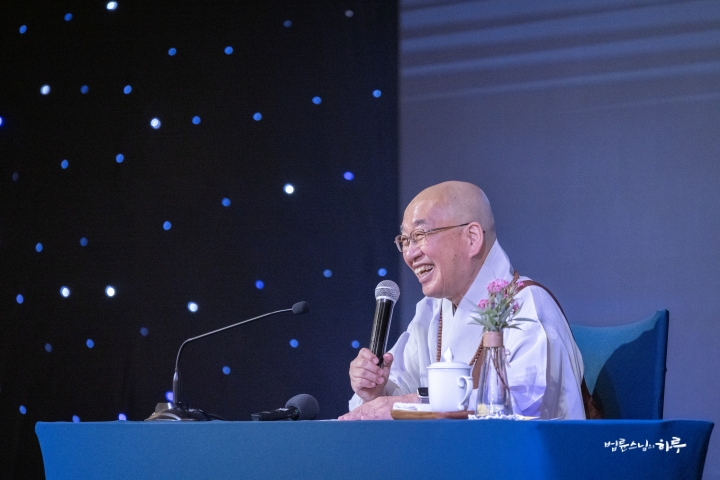
During married life, your partner might suddenly ask for a divorce one day. This is a request for a change in the relationship. While it may feel like a bolt from the blue, your partner has likely been thinking about it for a long time. You simply didn’t notice. For example, suppose you receive a cancer diagnosis at the hospital today. Did the cancer develop today? No. The cancer that was already there was discovered today. So did something bad happen today? No. Rather, something good happened today because the cancer was discovered. Yesterday you had cancer but didn’t know it, while today you know you have cancer, so today is better than yesterday. You should thank the doctor, saying, “Thank you for discovering the cancer.” You couldn’t respond because you didn’t know whether you had cancer or not, but now that you know, all that remains is deciding how to respond.
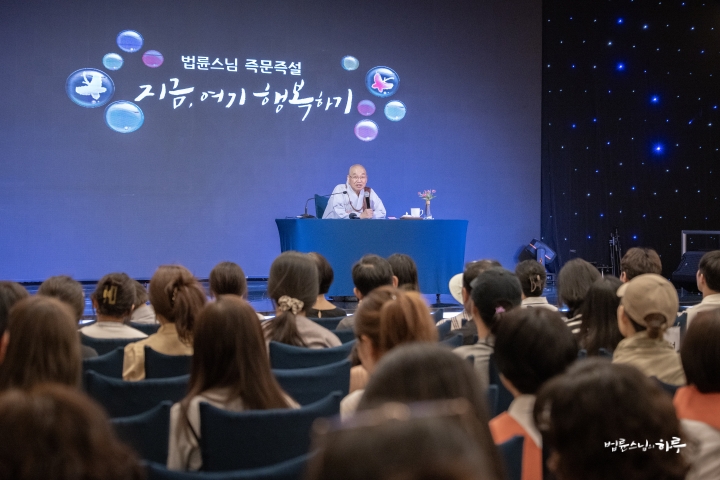
Depending on how I respond, I can either gain or lose. If there’s a high possibility of loss, the best response is to minimize that loss. If you bought stocks at 10,000 won and they seem likely to fall further, and the current price is 8,000 won, what should you do? It’s better to sell. Selling at 8,000 won is 3,000 won better than selling at 5,000 won. Instead of thinking, ‘I bought at 10,000 won and lost 2,000 won,’ you should think, ‘I gained 3,000 won.’ This is called a ‘stop-loss.’ While it may seem like a loss right now, in the long term, this becomes beneficial. However, people think that if they bought at 10,000 won, it’s only profitable when it reaches 15,000 or 20,000 won. That’s why they always end up losing. The same applies to treating illness. There are diseases that can be completely cured, cases where complete cure isn’t possible but deterioration can be prevented, and situations where the rate of deterioration can be slowed. Treatment doesn’t mean only complete recovery counts as treatment. But because you think of treatment as only complete cure, you suffer when complete recovery doesn’t happen.
Therefore, you need to change your thinking. Change presents various options. Among them, you need to consider which choice will benefit you or reduce your losses. With this perspective, even when you’re diagnosed with cancer, asked for a divorce, cheated on by your partner, face company bankruptcy, undergo inspection, or when President Trump suddenly imposes tariffs, you can accept the fact that ‘change has simply arrived.’ And you can think about how to respond. If closing down now means less loss, then you should close. You shouldn’t think of closing as failure. Closing is also one option for minimizing losses. If you live with this perspective, you’ll be able to live with more peace of mind in all your relationships.”
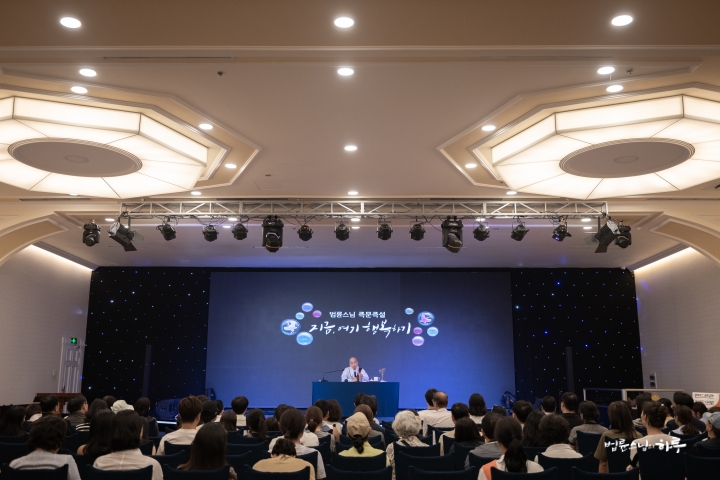
After finishing the conversation, it was past 9 PM. Sunim immediately held a book signing session on stage.
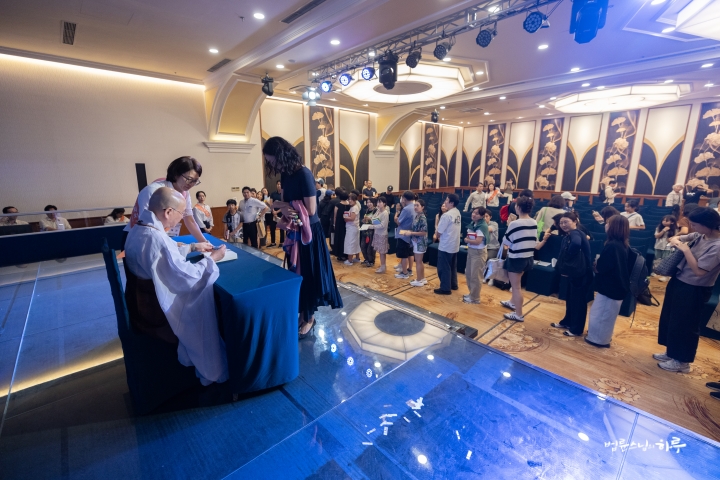
The Korean residents who attended the lecture formed a long line to receive Sunim’s autograph and exchange greetings.
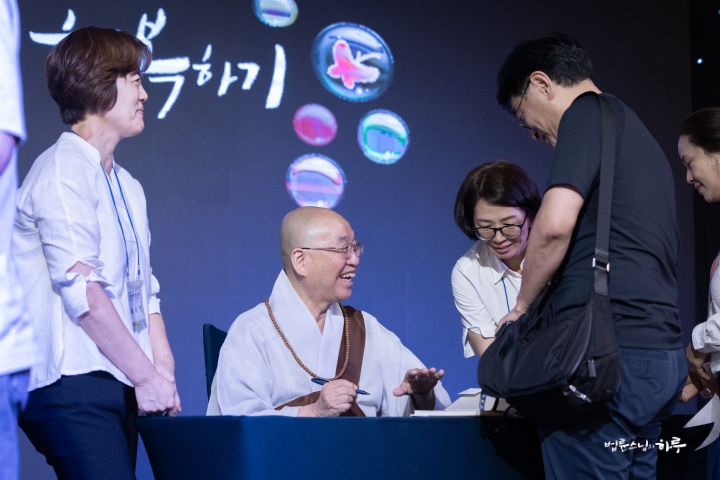
“Thanks to you, Sunim, I have become so much happier. Thank you.”
After the book signing, Sunim took a commemorative photo with the volunteers who had prepared the lecture.
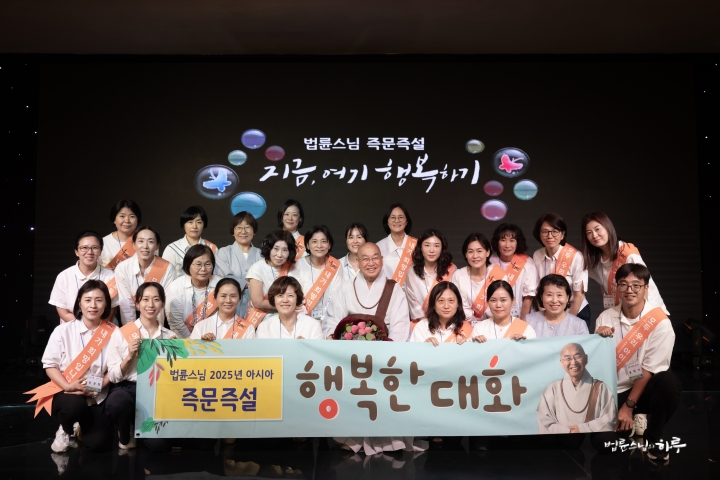
“Ho Chi Minh, fighting!”
After expressing his gratitude to the volunteers, Sunim moved to his accommodation.
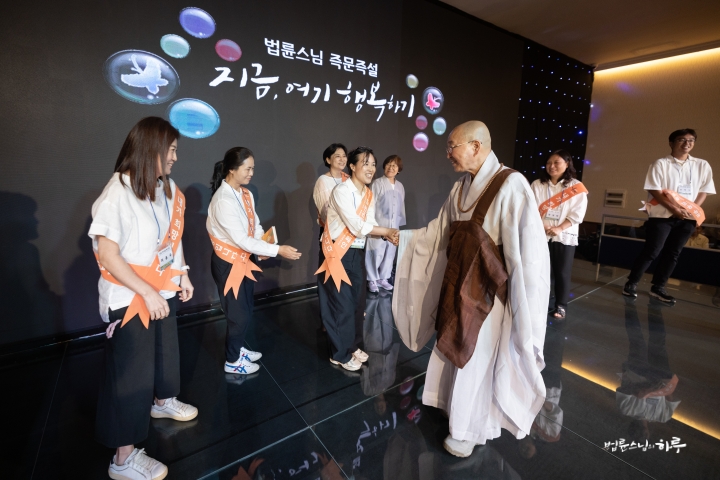
The volunteers sat in a circle with Dharma Teacher Myodeok and had a mindful sharing session. Many shared that they had learned a lot through the volunteering process and realized that volunteering itself is a form of practice.
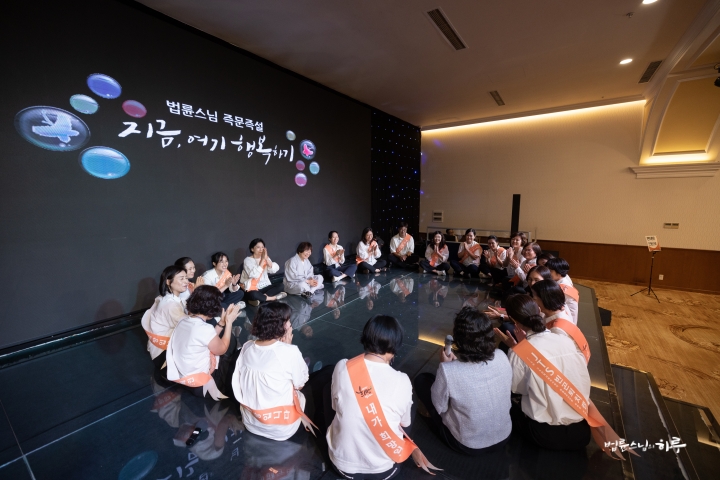
“I had only watched Venerable Pomnyun Sunim on YouTube in Korea and had never met him in person. But today, I was so happy to meet Sunim in person here in Ho Chi Minh. Taking part in this lecture led me to register for the Jungto Dharma School, and I was able to volunteer today as well. Thank you so much for creating this wonderful connection.”
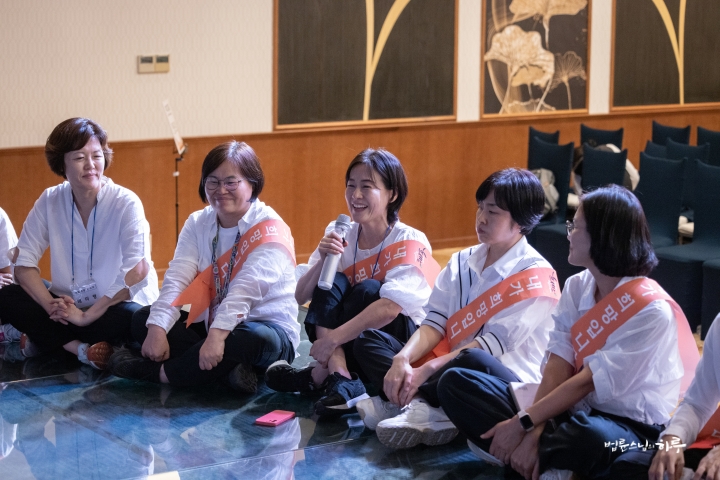
“I had only met people online through the Jungto Buddhism Course classes, but today while volunteering, I was able to meet them face to face. It was such a joyful and happy time. Through volunteering, I feel like I’m receiving a great gift.”
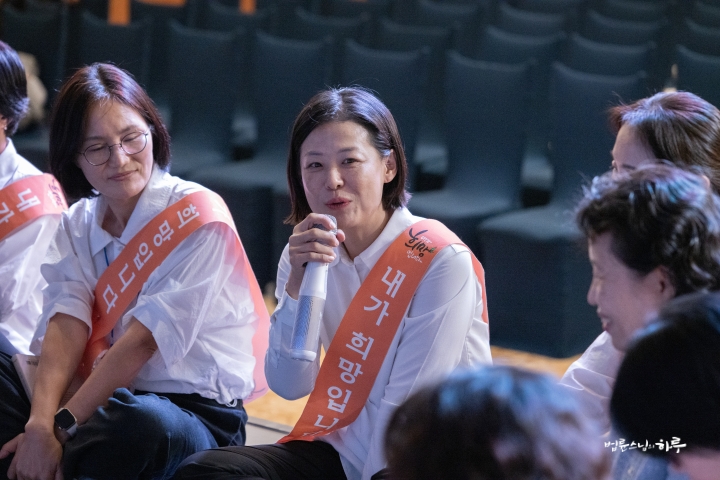
“Last year, I only attended the lecture, but I was so moved by the bright expressions on the volunteers’ faces. So today, I participated as a volunteer myself. Through volunteering, I’m learning and gaining so much more. Thank you.”
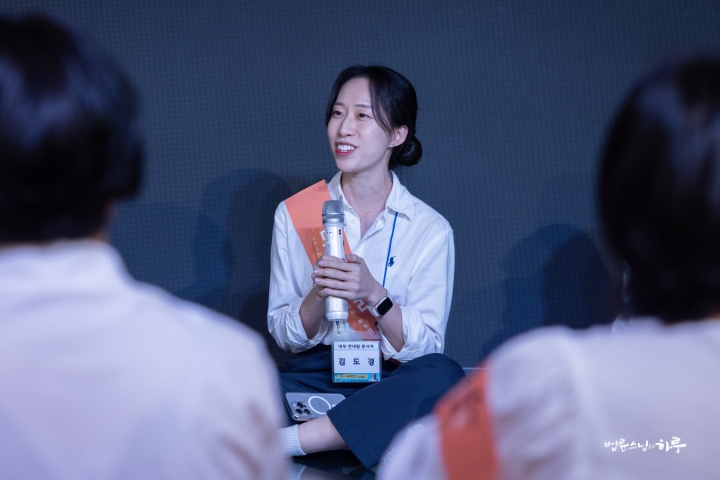
“I was deeply moved seeing people who were going through difficulties in life come here and leave with their concerns resolved. I was grateful to be able to make a small contribution to this work, and seeing how many volunteers cooperated to create this event, I understood what the mosaic Buddha truly means.”

They concluded the sharing session with loud applause, encouraging each other for their hard work. Returning to the accommodation, they finished today’s schedule after 11 PM.
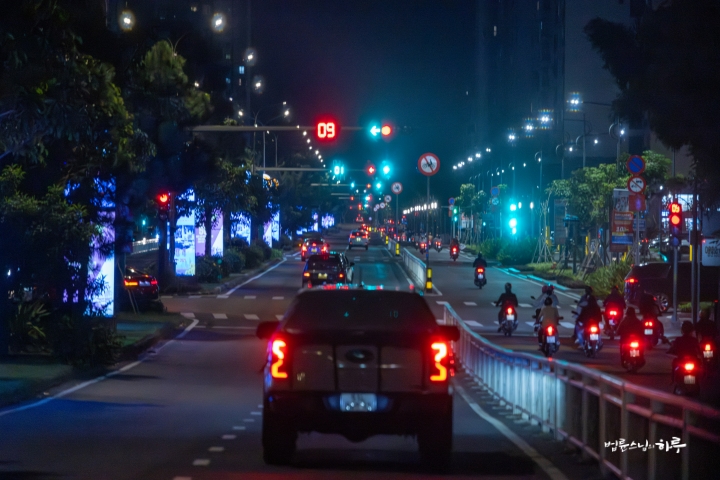
Tomorrow morning, Sunim will depart from Ho Chi Minh Airport to Hong Kong, and in the evening, he will continue with the third lecture of his Asia tour in Hong Kong.





